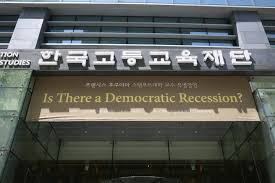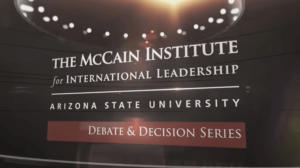 The United States must remain engaged in the struggle for democracy as a global leader, not only for moral, but also for national security reasons, according to a new report. But the prospect of U.S. retreat and isolationism represents “the gravest threat the liberal order faces,” a prominent analyst suggests.
The United States must remain engaged in the struggle for democracy as a global leader, not only for moral, but also for national security reasons, according to a new report. But the prospect of U.S. retreat and isolationism represents “the gravest threat the liberal order faces,” a prominent analyst suggests.
“While ultimately the establishment of democracy depends on the will of the people of a country, the support of the United States and other pro-democracy actors is often key to sustaining and strengthening those efforts,” says the Democracy and Human Rights Working Group, a nonpartisan group comprising academic and think tank experts and practitioners convened by Arizona State University’s McCain Institute for International Leadership. “With this support, the current challenges to freedom can be faced and reversed, making the world a more prosperous and safer place,” it adds.
 The report, Bucking the Democratic Recession, includes two sets of case studies: first, examples of countries that are sustaining democratic transitions thanks to significant support from the United States and other Western actors, including Tunisia and Ukraine; and second, recent examples of countries bucking the democratic recession and making democratic gains or experiencing notable political openings, such as Armenia, Ecuador and Malaysia.
The report, Bucking the Democratic Recession, includes two sets of case studies: first, examples of countries that are sustaining democratic transitions thanks to significant support from the United States and other Western actors, including Tunisia and Ukraine; and second, recent examples of countries bucking the democratic recession and making democratic gains or experiencing notable political openings, such as Armenia, Ecuador and Malaysia.
 If the U.S. does not advocate on behalf of democratic values, the authoritarian resurgence will gather momentum, according to Hal Brands, the Henry Kissinger Distinguished Professor at Johns Hopkins University’s School of Advanced International Studies.
If the U.S. does not advocate on behalf of democratic values, the authoritarian resurgence will gather momentum, according to Hal Brands, the Henry Kissinger Distinguished Professor at Johns Hopkins University’s School of Advanced International Studies.
There are three basic challenges testing the liberal order today, says Brands, the author of “American Grand Strategy in the Age of Trump”:
- The first is the instability caused by authoritarian great powers. These rivals have partially benefited from the order — particularly the access it provides to global markets and capital — but nonetheless view it as a barrier to their geopolitical designs. For Russia and China, the liberal international order is inherently threatening. This is because it is rooted in liberal values that pose an existential threat to all authoritarian regimes, and because it rests on structures and arrangements — such as U.S. alliances and military deployments — that limit their freedom of action. ….
- The second challenge is inadequate cohesion and cooperation among the countries that make up the order’s core. If the liberal order has been primarily an American project, Washington has always pursued that project with the help of countries that share basic U.S. interests and, in many cases, values. That approach, in turn, has been key to the order’s success: It has ensured the “world America made” has been underwritten not just by the power and initiative of the U.S., but also the power and initiative of broad geopolitical coalitions….
 This relates to the third challenge: the ebbing tide of political and economic liberalism. The liberal order is rooted in liberal values, but everywhere one looks, those values seem to be in retreat. An authoritarian resurgence is under way from Latin America to Europe and beyond: According to Freedom House, the number of countries experiencing declines in freedom has outnumbered those registering increases every year since 2006. Protectionist sentiments are surging, owing to uneven economic growth and feelings of cultural displacement. In any number of countries, xenophobia, narrow nationalism and other illiberal sentiments are forming a toxic mix.
This relates to the third challenge: the ebbing tide of political and economic liberalism. The liberal order is rooted in liberal values, but everywhere one looks, those values seem to be in retreat. An authoritarian resurgence is under way from Latin America to Europe and beyond: According to Freedom House, the number of countries experiencing declines in freedom has outnumbered those registering increases every year since 2006. Protectionist sentiments are surging, owing to uneven economic growth and feelings of cultural displacement. In any number of countries, xenophobia, narrow nationalism and other illiberal sentiments are forming a toxic mix.
Indeed, the gravest threat the liberal order faces is that the country that has traditionally taken the lead in spearheading action and defending it from danger will cease to play that role, Brands writes for Bloomberg.







